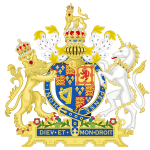البرلمان الأبتر
البرلمان الأبتر أو الكـَفـَل Rump Parliament هو اسم ازدرائي أُطلِق في عهد الكومنولث الإنگليزي (أي الحكومة الإنگليزية في عهد أوليڤر كروموِل ورتشارد كروموِل 1649-1660) على البرلمان الطويل بعد أن فـُصِل منه جميع النواب الموالين للملكية وعددهم 121 نائباً، عام 1648.
"الكـَفـَل Rump" عادة تعني مؤخرة الحيوان الثديي؛ واستخدامها يعني "البقية"، وقد سُجـِّلت في السياق أعلاه في الإنگليزية[أ]. ومنذ 1649، شاع استخدام التعبير "rump parliament" في الإشارة إلى أي برلمان متبقي بعد برلمان شرعي فعلي.
معاهدة نيوپورت
في سبتمبر 1648، في نهاية الحرب الأهلية الإنگليزية الثانية، كان البرلمان الطويل مشغولاً بتزايد الراديكالية في الجيش النموذجي الجديد. فبدأ البرلمان الطويل في التفاوض مع الملك تشارلز الأول. أراد النواب استرجاع الملك إلى السلطة، ولكن بعد الحد من سلطاته. تنازل تشارلز الأول عن سلطات للميليشيا، ضمن أشياء أخرى، إلا أنه اعترف لاحقاً أنه “فعل ذلك فقط ليتمكن من الفرار”.قالب:Whosequote[2] وفي نوفمبر، بدأت المفاوضات في الفشل، واستولى الجيش النموذجي الجديد على السلطة. ثم اعتقل ذلك الجيش الملك تشارلز الأول، في انتظار محاكمته بتهمة الخيانة.
انظر أيضاً
- Regicide
- قائمة برلمانات إنگلترة
- List of MPs not excluded from the English parliament in 1648
- List of Ordinances and Acts of the Parliament of England, 1642–1660
ملاحظات
الهامش
- ^ "rump, n.1". OED Online. June 2017. Oxford University Press. http://www.oed.com/view/Entry/168840?rskey=cLiRUL&result=1 (accessed October 12, 2017).
- ^ The Oxford Companion to British History (2nd ed.).
مراجع
- Monck, George (1671). Observations Upon Military and Political Affairs. Authority London.
للاستزادة
 Texts on Wikisource:
Texts on Wikisource:
- "Rump Parliament". New International Encyclopedia. {{{year}}}.
- Act erecting of a High Court of Justice (6 January 1649)
- Act prohibiting the proclaiming any person to be King England or Ireland (30 January 1649)
- Act repealing the Oaths of Allegiance (9 February 1649)
- Act constituting a Counsel of State (13 February 1649)
- Act for the abolishing the Kingly Office in England and Ireland (17 March 1649)
- Act for the Abolishing the House of Peers (19 March 1649)
- Act Declaring what Offences shall be adjudged Treason (14 May 1649)
- Act Declaring and Constituting the People of England to be a Commonwealth and Free-State (19 May 1649)
- Act Declaring what Offences shall be adjudged Treason (17 July 1649)
- Adams, George Burton; Stephens, Henry Morse (1901). Select documents of English constitutional history.
- "211 Sentence of the High Court of Justice upon the King, 27 January 1649". Select documents of English constitutional history. Archived from the original on 30 December 2010.
- "212 The Death Warrant of Charles I, 29 January 1649". Select documents of English constitutional history. Archived from the original on 30 December 2010.
- "218 Declaration by Oliver Cromwell and the Council of Officers after putting an End to the Long Parliament, 22 April 1653". Select documents of English constitutional history. Archived from the original on 18 June 2010.
- "20 April Cromwell's Dissolution of the Rump Parliament". Chambers' Book of Days. (With a shortened version of Cromwell's speech).
- Cromwell, Oliver (20 April 2003) [20 April 1653]. "Cromwell's Dissolution of the Rump Parliament". Archived from the original on 1 December 2005. (with a fuller version of Cromwell's speech)
- Ludlow, Edmund (1894). Firth, C.H. (ed.). The Memoirs of Edmund Ludlow, Lieutenant-General of the Horse in the Army of the Commonwealth of England, 1625-1672, with appendices of letters and illustrative documents (In two volumes ed.). Oxford: Clarendon Press.
- Plant, David (2 March 2009). "The Rump Parliament". British Civil Wars and Commonwealth website.
